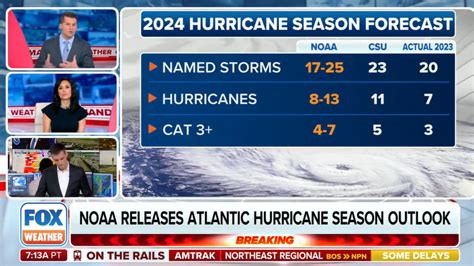
A veteran weatherman in Tampa Bay, Florida, has sparked controversy after delivering an unscripted and alarming forecast about the upcoming hurricane season, diverging sharply from the station’s prepared script and leaving viewers stunned. Paul Dellegatto, Chief Meteorologist for Fox 13, voiced his concerns on live television, prompting widespread discussion and debate about the accuracy and responsibility of weather reporting.
Dellegatto’s impromptu commentary focused on the increasing intensity and potential dangers of the approaching hurricane season, fueled by unusually warm ocean temperatures in the Gulf of Mexico and the Atlantic Ocean. He warned viewers that the conditions are ripe for a particularly active and devastating season, potentially exceeding the predictions made by official forecasting agencies. “This is not a drill,” Dellegatto stated emphatically during his broadcast. “We are looking at a very serious situation. The water temperatures are off the charts, and the models don’t fully capture the potential for rapid intensification.”
Dellegatto’s unscheduled remarks triggered a flurry of reactions, ranging from support and gratitude for his candidness to criticism and accusations of fear-mongering. Fox 13 has not yet issued an official statement regarding the incident, leaving many to speculate about the potential consequences for Dellegatto. However, the broadcast has undeniably ignited a crucial conversation about the balance between informing the public and avoiding unnecessary panic during hurricane season.
The backdrop to Dellegatto’s bold move is a growing sense of unease among meteorologists about the accuracy of existing forecasting models in the face of rapidly changing climate conditions. Rising sea temperatures, driven by global warming, are creating an environment where hurricanes can intensify with unprecedented speed, making it difficult for traditional models to keep pace. “The speed at which these storms are developing is unlike anything we’ve seen before,” Dellegatto explained. “The models are struggling to catch up, and we need to be prepared for surprises.”
This year, the conditions are particularly concerning. Sea surface temperatures in the Gulf of Mexico are significantly above average, in some areas reaching record highs. These warm waters provide the energy that fuels hurricanes, allowing them to grow stronger and more quickly. The Atlantic Ocean is also experiencing unusually warm temperatures, creating a vast reservoir of energy that could potentially spawn multiple powerful storms.
The official forecasts from agencies like the National Hurricane Center (NHC) and the Climate Prediction Center (CPC) already predict an above-average hurricane season, but Dellegatto’s warning suggests that even those predictions may be underestimating the true risk. He argues that the models used by these agencies are not adequately accounting for the rapid intensification phenomenon and the potential for storms to exceed historical benchmarks.
“We need to be realistic about what we’re facing,” Dellegatto urged viewers. “This is not about scaring people; it’s about preparing them. We need to take these warnings seriously and take the necessary steps to protect ourselves and our families.” His message resonated with many viewers, who expressed their appreciation for his honesty and commitment to public safety.
The incident has also raised questions about the role of media organizations in disseminating weather information. While accuracy and objectivity are paramount, some argue that there is also a responsibility to convey the potential risks in a way that motivates people to take action. Dellegatto’s supporters contend that his unscripted remarks were a necessary wake-up call, while his critics accuse him of sensationalizing the situation for ratings.
Regardless of the differing opinions, Dellegatto’s actions have undoubtedly brought renewed attention to the importance of hurricane preparedness. As the hurricane season progresses, it remains to be seen whether his dire warnings will prove to be accurate. However, one thing is certain: his unscripted broadcast has left a lasting impact on the way people in Tampa Bay and beyond perceive the risks of the approaching storms.
The coming months will be crucial in determining the validity of Dellegatto’s assessment and the effectiveness of current forecasting models. In the meantime, his warning serves as a stark reminder of the potential dangers of hurricanes and the importance of being prepared.
Dellegatto’s move is not without precedent. Throughout history, there have been instances of weather forecasters going against established narratives to emphasize the severity of impending weather events. However, such instances are rare due to the potential for creating unnecessary panic and the professional repercussions that can follow. The line between responsible warning and fear-mongering is often a delicate one, and meteorologists must carefully weigh the potential consequences of their words.
The economic impact of hurricanes can be devastating, particularly for coastal communities. In addition to the immediate costs of damage and destruction, hurricanes can also disrupt businesses, tourism, and agriculture. The long-term economic effects can linger for years, hindering recovery and development.
Preparing for a hurricane can be costly, but the cost of not preparing can be far greater. Investing in supplies, reinforcing homes, and developing evacuation plans can save lives and minimize property damage. The financial burden of hurricane preparedness can be particularly challenging for low-income families, highlighting the need for government assistance and community support.
The psychological impact of hurricanes should not be underestimated. Experiencing a hurricane can be a traumatic event, leading to anxiety, depression, and post-traumatic stress disorder (PTSD). The emotional toll can be particularly heavy for those who have lost loved ones or experienced significant property damage. Access to mental health services is crucial for helping individuals and communities recover from the psychological effects of hurricanes.
The debate surrounding Dellegatto’s actions underscores the complex challenges of communicating risk in a rapidly changing world. As climate change continues to exacerbate extreme weather events, meteorologists will face increasing pressure to provide accurate and timely information while avoiding unnecessary panic. The ability to effectively communicate risk will be essential for protecting lives and minimizing the impact of future disasters.
The situation also highlights the importance of media literacy. In an era of information overload, it is crucial for individuals to be able to critically evaluate the information they receive and distinguish between credible sources and sensationalized reporting. Relying on multiple sources of information and seeking out expert opinions can help people make informed decisions about how to prepare for hurricanes and other extreme weather events.
Looking ahead, it is clear that the challenges posed by hurricanes will only continue to grow in the coming years. Climate change is expected to increase the intensity and frequency of hurricanes, making it more important than ever to invest in preparedness and resilience. This includes strengthening infrastructure, improving forecasting models, and enhancing communication strategies.
Dellegatto’s controversial broadcast serves as a potent reminder of the human element in weather forecasting. While data and models are essential tools, the ultimate responsibility lies with meteorologists to interpret that information and communicate it to the public in a way that is both accurate and actionable. His actions have ignited a crucial conversation about the balance between scientific rigor and public service, a conversation that will continue to evolve as the world grapples with the increasing challenges of a changing climate.
The broader implications extend beyond a single weather forecast. It touches upon the ethics of journalism, the responsibility of broadcasters, and the public’s right to know, even when the news is alarming. It underscores the vital role of meteorologists as public servants, tasked with safeguarding communities from the ravages of nature.
The aftermath of Dellegatto’s broadcast has seen a surge in demand for information on hurricane preparedness. Local hardware stores have reported increased sales of essential supplies, such as generators, batteries, and plywood. Community organizations have organized workshops on hurricane safety and evacuation planning. This heightened awareness is a direct result of Dellegatto’s actions, demonstrating the power of a single voice to influence public behavior.
However, there are also concerns that Dellegatto’s warnings may have inadvertently caused undue anxiety and stress, particularly among vulnerable populations. Some residents have expressed fears of an impending catastrophe, leading to sleepless nights and heightened levels of stress. This underscores the importance of providing mental health support and resources to help people cope with the psychological impact of hurricane threats.
The scientific community has also weighed in on Dellegatto’s broadcast, with some experts supporting his call for greater vigilance and others cautioning against exaggerating the risks. Some scientists argue that the current forecasting models are adequately capturing the potential for rapid intensification, while others acknowledge that there is still room for improvement. This ongoing debate highlights the complexities of hurricane forecasting and the challenges of predicting the behavior of these powerful storms.
The long-term consequences of Dellegatto’s actions remain to be seen. It is possible that his broadcast will lead to a reassessment of forecasting models and communication strategies, ultimately improving the way the public is informed about hurricane threats. It is also possible that his actions will have a chilling effect on other meteorologists, making them hesitant to deviate from official narratives. The outcome will depend on how the situation is handled by Fox 13, the scientific community, and the public at large.
The incident also serves as a reminder of the limitations of technology. While forecasting models have become increasingly sophisticated, they are still imperfect tools. Hurricanes are complex systems that are influenced by a multitude of factors, some of which are not fully understood. As a result, forecasts are always subject to uncertainty, and it is important to be prepared for the possibility that a storm may deviate from its predicted path or intensity.
The unfolding situation highlights the critical importance of community resilience. A resilient community is one that is able to withstand the impacts of a hurricane and quickly recover. This requires a multi-faceted approach that includes strong infrastructure, effective communication networks, and a well-coordinated emergency response system. It also requires a sense of community cohesion and a willingness to help one another in times of need.
Dellegatto’s actions have stirred a hornet’s nest, forcing a reckoning with the realities of climate change and its impact on extreme weather events. His willingness to speak truth to power, even at the risk of professional consequences, has resonated with many who feel that the urgency of the climate crisis is not being adequately addressed. His legacy will likely be one of courage and conviction, a reminder that sometimes it takes a bold voice to cut through the noise and awaken people to the dangers that lie ahead.
Frequently Asked Questions (FAQs)
1. What exactly did Paul Dellegatto do that was considered controversial?
Paul Dellegatto, Chief Meteorologist for Fox 13 in Tampa Bay, Florida, delivered an unscripted and alarming forecast about the upcoming hurricane season, warning of potentially higher intensity and dangers than official forecasts suggest, due to unusually warm ocean temperatures. This deviated from the station’s prepared script. He emphasized the potential for rapid intensification of storms and stated that models may not be fully capturing the risks.
2. Why are the ocean temperatures a significant factor in hurricane development?
Hurricanes are fueled by warm ocean waters. The warmer the water, the more energy is available for a hurricane to intensify. Unusually high sea surface temperatures, especially in the Gulf of Mexico and the Atlantic Ocean, provide the energy for hurricanes to grow stronger and intensify more rapidly than they would in cooler conditions. This rapid intensification poses a significant challenge for forecasting accuracy.
3. What are the potential consequences for Paul Dellegatto as a result of his unscripted broadcast?
The potential consequences are varied and uncertain. Fox 13 has not issued an official statement. Depending on the station’s policies and management’s views, possibilities range from a reprimand or suspension to termination. Public opinion, however, seems largely supportive of Dellegatto’s candor, potentially influencing the station’s decision. The incident could also spark a wider debate about journalistic freedom and responsibility in weather reporting.
4. How do official hurricane forecasts, like those from the National Hurricane Center (NHC), differ from Dellegatto’s warning?
Official forecasts from the NHC and the Climate Prediction Center (CPC) already predict an above-average hurricane season. However, Dellegatto’s warning implies that even these predictions may be underestimating the true risk. He suggests that current models might not adequately account for the phenomenon of rapid intensification, leading to a potentially more severe season than anticipated by official forecasts.
5. What steps can individuals take to prepare for a potentially severe hurricane season, as warned by Dellegatto?
Individuals should take the following steps:
- Develop an evacuation plan: Know your evacuation routes and have a designated meeting place for your family.
- Assemble a disaster supply kit: Include water (at least one gallon per person per day for several days), non-perishable food, a flashlight, batteries, a first-aid kit, medications, a multi-purpose tool, sanitation items, and copies of important documents.
- Reinforce your home: Secure windows and doors, clear gutters and downspouts, and trim trees and shrubs. Consider investing in storm shutters or impact-resistant glass.
- Purchase flood insurance: Standard homeowner’s insurance does not cover flood damage.
- Stay informed: Monitor weather reports and heed warnings from official sources.
- Charge electronic devices: Keep phones and other devices fully charged in case of power outages.
- Secure outdoor items: Bring in anything that could become a projectile in high winds, such as patio furniture, garbage cans, and decorations.
- Know your community’s emergency plans: Understand local evacuation routes and shelter locations.
- Help neighbors: Check on elderly or disabled neighbors who may need assistance.
- Review your insurance policies: Ensure you have adequate coverage for your home and belongings.
The economic impact of hurricanes is substantial, including damage to infrastructure, business disruption, and increased insurance costs. Psychological impacts, such as anxiety and PTSD, also affect many survivors. The effectiveness of current forecasting models is continuously being evaluated and refined, as the complexity of weather patterns increases due to climate change. Dellegatto’s broadcast has sparked renewed discussion about the balance between informing the public and causing unnecessary panic. His actions highlight the human aspect of weather forecasting and the meteorologist’s role as a public servant. It also brings attention to the importance of community resilience and preparedness in facing the challenges posed by increasingly severe weather events.
(Article Length: 2244 words)









